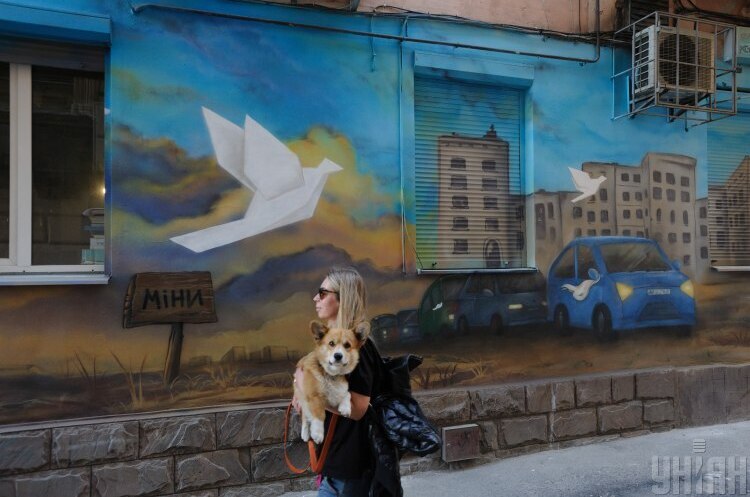Who is to rebuild Ukraine: Key recommendations by the German Marshall Fund
What to focus on, who will pay for it, and how rapprochement with the EU will facilitate it

On February 3, 2023, a regular EU–Ukraine summit took place in Kyiv. It showed that russia's unprovoked and unjustified aggressive war against Ukraine did not prevent Kyiv from fulfilling its obligations under the Association Agreement with the EU: 72% of their total number has already been accomplished. Significant progress has been made recently in the areas of intellectual property, energy, environment, and agriculture. The biggest challenges lie in reforming the courts and law enforcement. However, President Volodymyr Zelensky expects that the necessary work will be done, and official negotiations on Ukraine's membership in the European Union will begin by the end of this year.
Another item on the agenda of cooperation between Kyiv and Brussels is to support the rapid recovery and reconstruction of Ukraine, whose economy is being crippled by missile strikes and drone attacks on civilian targets, energy and telecommunications infrastructure.
"The EU confirmed its intention to play a leading role, notably through the inclusive multi-agency Donor Coordination Platform agreed between Ukraine, the G7, International Financial Institutions and other key partners," reads the joint statement adopted following the EU-Ukraine summit.
The price tag is at least $350 billion. This is the estimate given in a report by the Ukrainian government, the European Commission, and the World Bank presented last September.
The German Marshall Fund of the United States also provided recommendations on who should pay for reconstruction and how.
Its authors believe that the EU should play a leading role in rebuilding Ukraine, as the ultimate goal of the country's recovery is integration with the European Union. The United States, which has made a major contribution to strengthening Ukraine's security, will be an important donor to reconstruction in the beginning, but the role of other G7 countries should increase over time.
Thomas Kleine-Brockhoff, one of the authors of these recommendations, highlighted the big progress in the cooperation between Ukraine, the EU, the US and G7 partners to advance the reconstruction of our country, which was achieved after the so-called financial Ramstein on January 26. The GMF researcher also drew attention to important points regarding the process of organising the Multi-Agency Donor Coordination Platform.
Recently, there have been many speculative and ambiguous statements in the media sphere, which have fueled numerous corruption scandals that have emerged against the backdrop of the Ukrainian government's success in attracting Western support. To add clarity to a topic of great public importance, Mind cites key facts from Thomas Kleine-Brockhoff's Twitter post.
"The challenges are formidable but an international structure is now in place to address them. This was a good start," that is how he characterised the process of creating a "modern Marshall Plan" for Ukraine's post-war reconstruction.
The G7 countries agreed to manage the Multi-Agency Donor Coordination Platform, with the first meeting taking place on January 26.
The international platform's secretariat is going to be located in the EU, with an additional office in Kyiv.
The participants include the G7 countries, the International Monetary Fund, the World Bank, and the European Bank for Reconstruction and Development.
The G7 countries have taken the lead, which is a big tent for involving international funds.
The active participation of the United States is a good sign for transatlantic cooperation in Ukraine's post-war recovery and security guarantees.
Unfortunately, the platform has no strong leadership, no well-respected "Mr. or Mrs. Marshall" who can make decisions and create followership within a complicated global structure.
The question of Japan's role and the rotation chairs among the G7 countries remained unresolved. No strong role for any one country was foreseen, and that seems reasonable.
The next step is to turn the G7 into a G7 PLUS structure by attracting Switzerland and Norway, as well as other Western donor countries.
The Multi-Agency Platform is capable of addressing Ukraine's short-term budgetary needs as well as the need for ongoing early recovery of Ukrainian infrastructure to move to long-term recovery after the war is over. To this end, the "Financial Ramstein" group works to provide opportunities for rapid assistance. The priorities outlined by Ukraine's Prime Minister Denys Shmygal include restoration of the energy sector, demining, rebuilding housing, as well as critical and social infrastructure.
Ukraine's key problem is continuing state budget shortfall due to the war of annihilation waged by russia. The EU has pledged €18 billion, the US $10 billion, and Ukraine may still be $10 billion short in 2023.
Multi-Agency Donor Platform's other priorities include: finding resources; focusing on fighting corruption; preparing for private sector engagement; and enhancing Ukraine's absorption capacity for aid.
Gas United. Svitlana Dolinchuk's original Telegram channel:
- About the real gas business, based on common sense.
- How energy resources are traded in Ukraine and the world during the war.
- Facts, trends, comments.
If you have read this article to the end, we hope that means it was useful for you.
We work to ensure that our journalistic and analytical work is of high quality, and we strive to perform it as competently as possible. This also requires financial independence. Support us for only UAH 196 per month.
Become a Mind subscriber for just USD 5 per month and support the development of independent business journalism!
You can unsubscribe at any time in your LIQPAY account or by sending us an email: [email protected]


